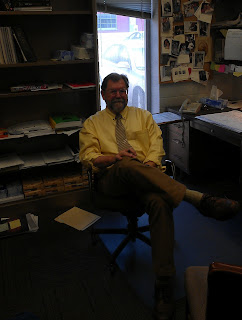 |
| Professor Andy Anderson explains the biology of the zombie infection |
Blood and rotting
carcasses are scattered across Utah State University campus, spreading
infection to all who come in contact.
But while many humans are fighting the battle against zombies, others are searching for alternative solutions.
Utah State University health officials have studied the biology of the zombie infection and are developing a vaccine to immunize humans. There is currently no cure available for those already infected.
"We've seen a bigger issue this year with the zombie prevalence," said USU Student Health and Wellness Center representative Andrea Sinfield. "This is the first year we are actually doing the vaccine and it’s a test run, but we've seen great results in the lab. It looks like we are going to be able to get rid of the zombie problem.”
Sinfield said the vaccine is available to all surviving humans, but eliminating the virus from those already infected is proving more difficult.
“The infection basically kills the human body and reanimates it,” human resistance leader Sgt. Tony Edwards said.
Andy Anderson, a biology professor at the university, believes that even though humans now have an increased knowledge of the infection, zombies are increasing in number, forcing humans to find short-term solutions.
"There are life forms that are very resistant,” Anderson said.“The most resistant one that comes to mind right now is prions. They are self-replicating proteins. They have no genetic material. The only way to reliably kill off prions is to reduce them to ash.”
Until an antidote is developed, humans may eliminate zombies by starvation or by burning them.
UnDeadline reporters Addison Hall, Brooklin Peterson, Blake DeVries, Kyle Heywood, Ryan Gudmunson and Tavin Stucki contributed to this report.
But while many humans are fighting the battle against zombies, others are searching for alternative solutions.
Utah State University health officials have studied the biology of the zombie infection and are developing a vaccine to immunize humans. There is currently no cure available for those already infected.
"We've seen a bigger issue this year with the zombie prevalence," said USU Student Health and Wellness Center representative Andrea Sinfield. "This is the first year we are actually doing the vaccine and it’s a test run, but we've seen great results in the lab. It looks like we are going to be able to get rid of the zombie problem.”
Sinfield said the vaccine is available to all surviving humans, but eliminating the virus from those already infected is proving more difficult.
“The infection basically kills the human body and reanimates it,” human resistance leader Sgt. Tony Edwards said.
Andy Anderson, a biology professor at the university, believes that even though humans now have an increased knowledge of the infection, zombies are increasing in number, forcing humans to find short-term solutions.
"There are life forms that are very resistant,” Anderson said.“The most resistant one that comes to mind right now is prions. They are self-replicating proteins. They have no genetic material. The only way to reliably kill off prions is to reduce them to ash.”
Until an antidote is developed, humans may eliminate zombies by starvation or by burning them.
UnDeadline reporters Addison Hall, Brooklin Peterson, Blake DeVries, Kyle Heywood, Ryan Gudmunson and Tavin Stucki contributed to this report.
